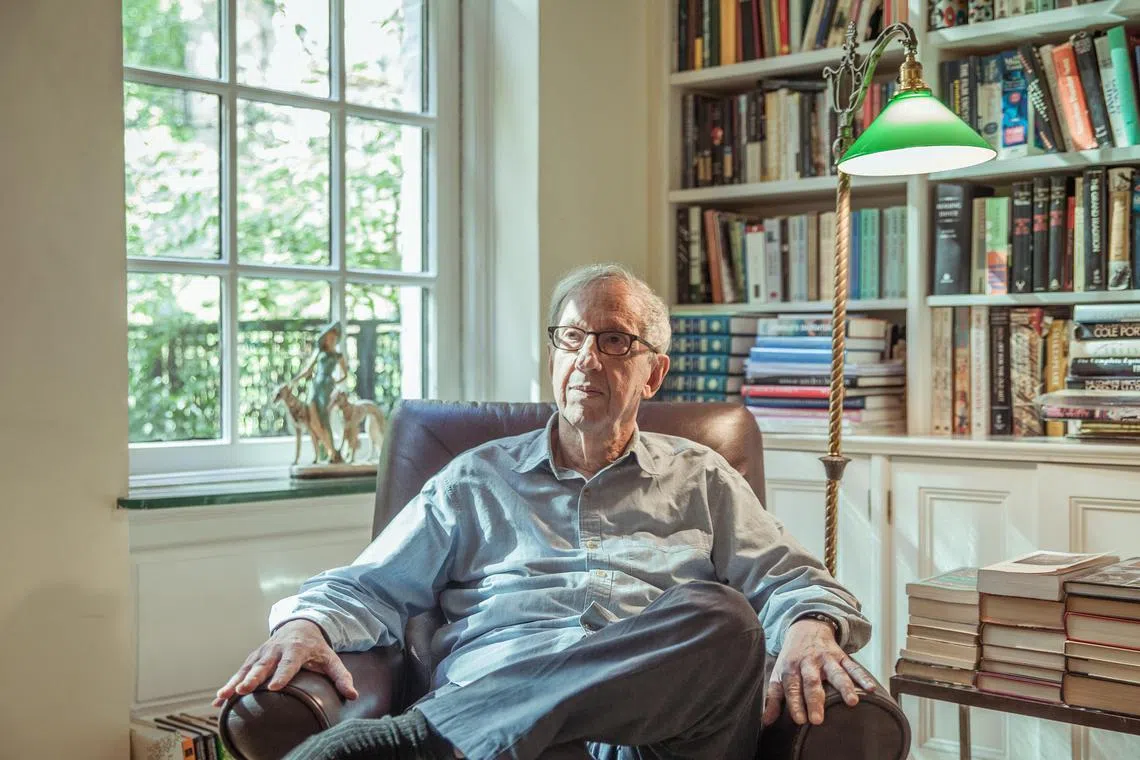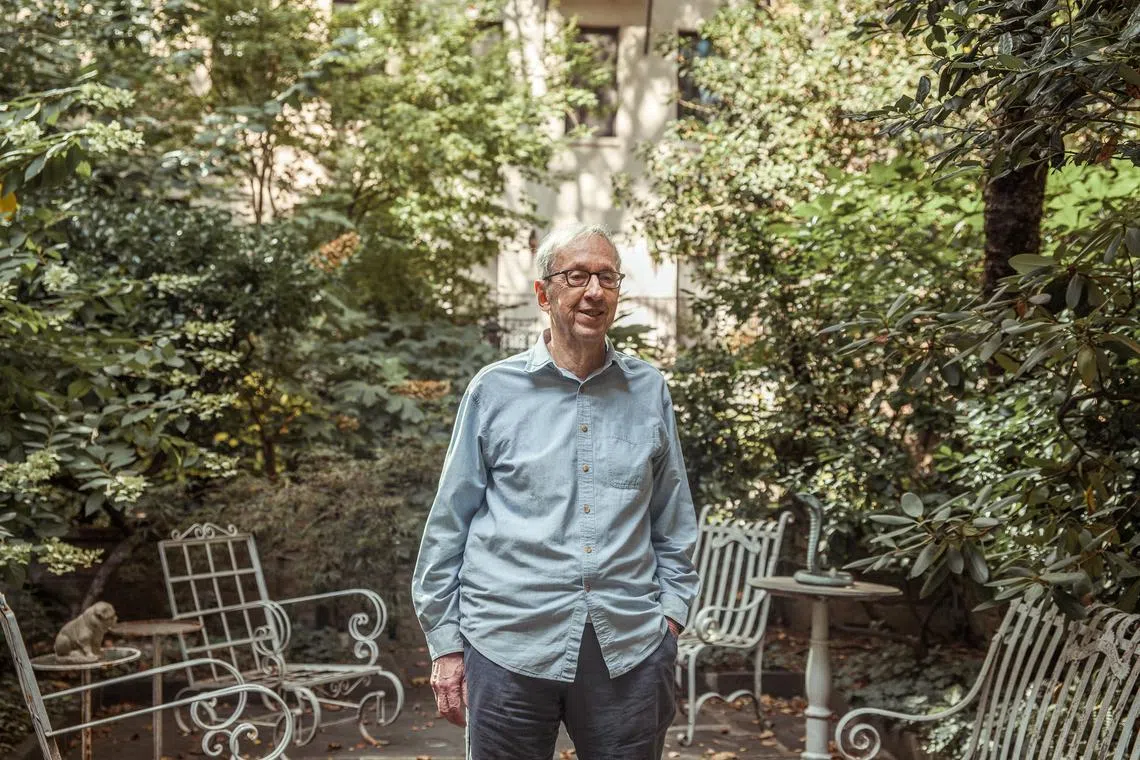Robert Gottlieb, eminent editor of John le Carre to Bill Clinton, dies at 92
Sign up now: Get ST's newsletters delivered to your inbox

Robert Gottlieb, an illustrious editor at Simon & Schuster, Alfred A. Knopf and The New Yorker, died on Wednesday in Manhattan.
PHOTO: NYTIMES
NEW YORK – Robert Gottlieb, an illustrious American editor at Simon & Schuster, Alfred A. Knopf and The New Yorker whose deft touch shaped a bibliophile’s library of novels, non-fiction books and magazine articles by a pantheon of acclaimed writers from the middle to the late 20th century, died on Wednesday in Manhattan. He was 92.
The death at a hospital was confirmed by his wife, American actress Maria Tucci.
Gottlieb edited novels by, among many others, John le Carre, Toni Morrison, John Cheever, Joseph Heller, Doris Lessing and Chaim Potok; science-fiction by Michael Crichton and Ray Bradbury; histories by Antonia Fraser and Barbara Tuchman; memoirs by former United States president Bill Clinton and Katharine Graham, the former publisher of The Washington Post; and works by Jessica Mitford and Anthony Burgess.
For three decades at publishing houses Simon & Schuster and Knopf, he turned hundreds of manuscripts into well-received books, many of which sold millions of copies, won awards and made authors wealthy and famous.
Colleagues called him incisive but sensitive to writers’ eggshell egos. His skills won him a following of authors, and he became Knopf’s president and editor-in-chief.
In 1987, in an abrupt career change from the relative anonymity and serenity of book publishing, Gottlieb was named the third editor in the 62-year history of The New Yorker, one of American journalism’s highest-profile jobs.
He replaced Mr William Shawn, the magazine’s legendary editor for 35 years, who had succeeded the founding editor, Mr Harold Ross.
The appointment by S.I. Newhouse Jr, whose family owned both Knopf’s parent company, Random House, and The New Yorker, hit the staff like a bomb.
A petition by 154 writers, editors and others protested the forced retirement of Shawn, who had made journalism history with breakthrough articles that became best-selling books, including John Hersey’s Hiroshima, on the first atomic bombing of a city; Hannah Arendt’s Eichmann In Jerusalem; and Rachel Carson’s Silent Spring.
The petition noted Gottlieb’s reputation for brilliance but nonetheless urged him to withdraw, saying that an insider like Charles McGrath, the magazine’s fiction editor and heir apparent, could best serve its traditions.
McGrath later became editor of The New York Times Book Review and a writer-at-large for the Times.
But Gottlieb refused to step aside and plunged into the topsy-turvy world of weekly deadlines and strange editor-writer relationships that reversed his long experience in book publishing.
“In a publishing house, you are in a strictly service job as an editor,” he recalled in The Art Of Making Magazines, a 2012 anthology. “Your job is to serve the book and the writer.”
It was different at The New Yorker, he said. “You are the living god. You are not there to please the writers, but the writers are there to satisfy you because they want to be in the magazine.”

Robert Gottlieb edited novels by, among many others, John le Carre, Toni Morrison, John Cheever, Joseph Heller, Doris Lessing and Chaim Potok.
PHOTO: NYTIMES
Easing the apprehensions of many New Yorker aficionados, he made few and mostly minor changes over five years. He published new contributors, including journalist Raymond Bonner, essayist Judith Thurman and poet Diane Ackerman, and fiction by Robert Stone and Richard Ford.
New critics were hired, and Talk Of The Town commentaries were opened to more writers and were no longer written anonymously. But he did not shorten the long articles that critics sometimes called long-winded and boring, and he gradually won the trust and affection of most of the staff.
In 1992, Ms Tina Brown, British editor of Vanity Fair, replaced Gottlieb in an amicable transition.
After his New Yorker days, Gottlieb in time resumed editing for Knopf; became a dance critic for The New York Observer; compiled anthologies on dance, jazz and lyrics; and wrote several books, including a 2016 memoir, Avid Reader: A Life, in which he addressed the pros and cons of the literary life.
“There are editors who will always feel guilty that they aren’t writers,” he explained. “I can write perfectly well – anybody who’s educated can write perfectly well. It’s very, very hard, and I just don’t like the activity. Whereas reading is like breathing.”
His memoir offered a highlight reel of snarky critiques of authors – Nobel laureate V.S. Naipaul (“a snob”), Tuchman (“her sense of entitlement was sometimes hard to deal with”), William Gaddis (“unrelentingly disgruntled”) and Roald Dahl (“erratic and churlish”).
“He wasn’t just an editor, he was the editor,” Le Carre told the Times. “I never had an editor to touch him, in any country – nobody who could compare with him.”
He noted that Gottlieb, using No. 2 pencils to mark up manuscripts, often signalled changes with hieroglyphics in the margins: a wavy line for language too florid, ellipses or question marks advising a writer to “think harder and try again”.
Robert Adams Gottlieb was born in Manhattan on April 29, 1931, the only child of Charles and Martha Gottlieb. His father was a lawyer, his mother a teacher. He grew up on the Upper West Side and attended the Ethical Culture School.
A sickly, lonely, unhappy child, he sought refuge in books, which he sped through. As a teenager, he said, he read Leo Tolstoy’s War And Peace in a day and Marcel Proust’s monumental Remembrance Of Things Past in a week.
“I would read three to four books a day after school, and could read for 16 hours at a time,” he told the Times in 1980. “Mind you, that’s all I did. I belonged to three lending libraries and the public library.”
At Columbia University, he breezed through literature studies and earned a bachelor’s degree, with a Phi Beta Kappa key, in 1952. He received a postgraduate degree from the University of Cambridge in England in 1954.
In 1952, Gottlieb married Ms Muriel Higgins. They had a son, Roger, before divorcing. He married Tucci in 1969. They had two children, Lizzie and Nicky. Besides Tucci, he is survived by his children and twin grandsons. NYTIMES


